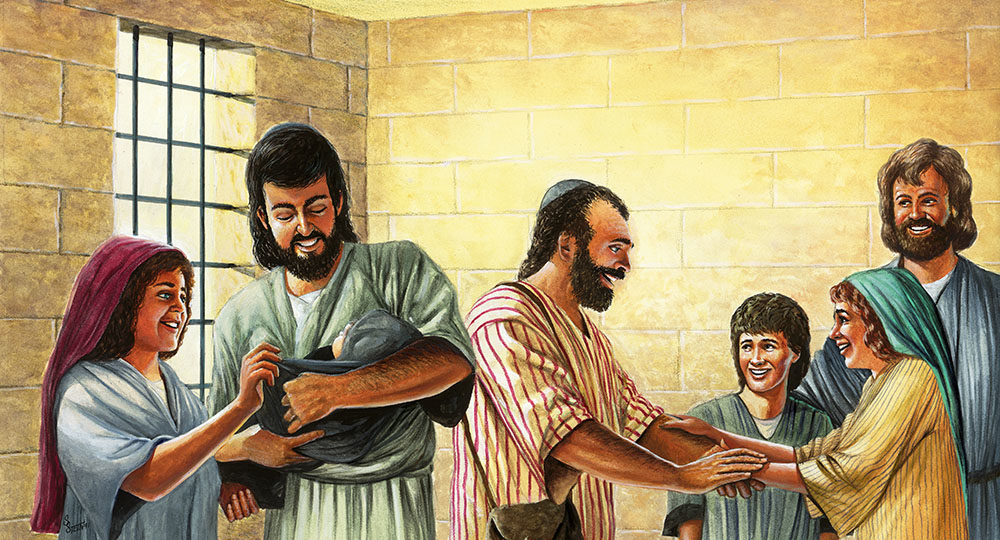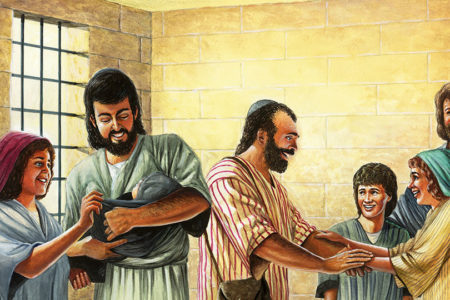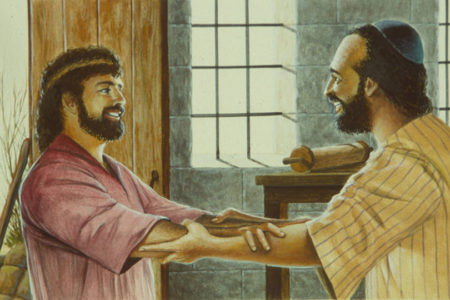A Mentor’s Model for Ministry 1 Thessalonians 2
Paul had presented the gospel on three consecutive Sabbaths in the synagogue at Thessalonica. The Spirit of God had convicted the congregants, resulting in many Jews and a great multitude of Gentiles coming to faith in Christ. Moved with envy, the unbelieving Jews of Thessalonica hired vile men to assault the new believers, whereupon the brethren sent Paul and Silas to Berea for their own safety. The apostle’s abrupt departure brought accusations that Paul was a religious charlatan preaching for financial gain and personal honor. If such accusations against his character and motives went unanswered, it could destroy the Thessalonian church or at least severely stunt its growth.
Taking pen in hand, Paul wasted no time in reviewing his ministry among the Thessalonians in order to encourage this young, struggling church as they faced persecution. Paul, the mentor, is a classic model for ministry to all who are in the Lord’s service.
Paul’s Preaching
With deep affection, Paul reminded the “brethren” (v. 1) of his motive, message, and ministry while among them. He stated emphatically, “For yourselves, brethren, know our entrance in unto you, that it was not in vain” (v. 1). The words “know” (vv. 1, 2, 5, 11), “remember” (v. 9), and “witnesses” (v. 10) were used to reinforce the fact that the Thessalonian believers had firsthand, experiential knowledge of Paul’s ministry because they had come to salvation through it (1:9). They could testify that his ministry was not “in vain” (v. 1) or empty of content (cp. 1:5). In other words, Paul’s preaching was not void of content, truth, boldness, or power. Those who mount the pulpit each Sunday to herald the gospel should emulate the apostle’s style of preaching.
Paul’s Plight
Paul and Silas had suffered severely to deliver the gospel on their second missionary journey. They had been “shamefully treated … at Philippi” (v. 2; cp. Acts 16:23–24). They had been falsely arrested, charged, imprisoned, disrobed, put in stocks with the worst of criminals, beaten, and publicly humiliated, and Paul was a Roman citizen.1 Still aching and weakened from such horrific treatment, they painfully made their way to Thessalonica to preach. Their story was naturally revealed when inquiries were made by the Thessalonians concerning their physical condition. Nevertheless, their speech in the synagogue was “bold” (v. 2). Only the Holy Spirit could have provided them with such strength and freedom of speech to continue proclaiming the gospel after their experience in Philippi for they did it “with much contention” (v. 2), or strong opposition and conflict. This account pictures an athlete’s struggle and strain, both physical and psychological, as he tries to overcome his opponent. If Paul and Silas had been preaching only for personal fame and financial gain, they would never have gone to Thessalonica, so soon after being treated so harshly in Philippi to face the same treatment again.
Paul’s Purity
Paul presented four arguments in defense of his position. First, the missionaries received strength and sincerity of speech in the face of persecution because their motives were sterling. Their message was not one of “deceit” but of truth; their motivation was not “uncleanness” (impurity); their method was not delivered in “guile” (trickery), to mislead or deceive, but in a straightforward manner (v. 3).2
Second, their stewardship to minister came from the Lord. They were “allowed [approved] of God … who testeth [approved] our hearts” (v. 4). They were servants who had been tried and tested by God and were found worthy to be entrusted with the gospel. Therefore, they preached to please God, not men (v. 4; cp. Gal. 1:10). The Thessalonian believers could attest to this fact.
Third, their words and works had come under close scrutiny: “For neither at any time used we flattering words” (v. 5). They did not use praise to gain influence over others for their own selfish ends. Neither did they wear a “cloak of covetousness” (v. 5), using the gospel to mask a true motive of greedy gain. Paul validated his statement with “God is witness” (v. 5).
Fourth, Paul and Silas were not selfishly seeking personal “glory” (v. 6) or praise and applause. They did not want to be “burdensome” (v. 6) to the Thessalonians by flaunting their influence and power or demanding honor and financial gain for their services. They came with a servant’s spirit, without reservation or thought for their own needs, to minister to the needs of others. Their one passion was to please God (v. 4).
Paul’s Pastoring
The ministry team did not come with an authoritarian attitude, but in a spirit of patience and sensitivity to the Thessalonians’ needs. Two metaphors express the extreme care they showed for them. First, they were “gentle” (v. 7), showing tender, loving, protective care to the new converts they were discipling in the faith. Second, they cared for them as “a nurse [mother] cherisheth her children” (v. 7). The word cherisheth means to warm—as a bird warms and protects her young, covering them with her feathers. The nursing mother cares for her child without seeking profit or honor; in like manner, the missionary cared for his beloved converts.3
The team showed great compassion. Paul said, “being affectionately desirous of you, we were willing to have imparted unto you, not the gospel of God only but also our own souls” (v. 8). They continually loved these new believers, seeking only their welfare and demanding nothing in return.
They took the gospel to them at great personal cost. Paul called upon the church to remember their “labor and travail … night and day” (v. 9) so that they would not have to depend upon the church for their livelihood (cp. Acts 18:3). The word labor describes the internal weariness suffered, while travail pictures the external obstacles and problems they faced in their work. Notice that they did not put in just eight hours but labored in secular work “night and day” (around the clock). Although a laborer for the gospel is worthy of support (1 Cor. 9:3–14), Paul did not exercise this right in many of the areas where he established churches (1 Cor. 4:12; 2 Cor. 11:8; Acts 20:34–35). It is very different today. Many will not become involved in a church-planting ministry because it often requires secular work until the new ministry becomes self-supporting.
The church could attest to the team’s conduct. “Ye are witnesses … how holily and justly and unblamably we behaved ourselves among you that believe” (v. 10). Their works were untainted, transparent, and authentic, without reproach in morals, manners, and motives in ministry. The Thessalonian believers could put to silence the false accusations against the team’s character and motives by their own personal testimony.
The team not only cared for them as a mother but charged them as a father. Their fatherly ministry encompassed three areas. First, they “exhorted” or urged them not to become stagnant in their growth but to go on in the Lord. Second, they “encouraged” or comforted those being tried, both mentally and physically, for their faith. Third, they “charged” or testified earnestly, insisting that they persevere in total commitment to the Lord. This was done on a one-to-one basis to “every one of you” (v. 11). Paul the preacher was also Paul the pastor, personally ministering to the individual’s needs.
Paul’s charge directed the new converts to “walk worthy of God”—to order their character and conduct in ways that would glorify the God who had called them (v. 12). The team was at Thessalonica not only to evangelize the people but to impart to them Christ’s life, their goal being to educate, edify, and exhort them to godly living as they anticipated Christ’s return. The believers were now part of God’s spiritual kingdom, and they should have been looking forward to the goal of their calling—sharing in Christ’s physical kingdom with all its glory at His Second Coming (v. 12).
Paul’s Praise
Paul continually praised God that the Thessalonians had received the Scriptures not as the word of men but as the Word of God (v. 13). The apostle used two different words for receive. First, they received the Scripture objectively, that is, passively, as God’s Word. Second, they received God’s Word subjectively or inwardly, welcoming it with approval in their minds and hearts (v. 13).4 It was the truth of God’s Word, faithfully proclaimed by the missionary team, that effectually worked (v. 13), turning them “from idols, to serve the living and true God” (1:9). Thus, the Thessalonian believers became “followers [imitators] of the churches … in Judea” as they served “Christ Jesus” (v. 14). Their total commitment to Christ brought suffering to the new believers from their “countrymen” (v. 14), who had persecuted them for their faith, just as the Jews persecuted the Judean churches. The Jewish leaders had participated in the slaying of “the Lord Jesus and their own prophets” (v. 15). Jesus continually accused them of such crimes (Mt. 23:31, 37; Lk. 11:47–48; cp. Acts 7:52), emphasizing that His own death was the culmination of their murderous activities (Mt. 21:33–41).5
Paul was not blaming the Jews exclusively for Jesus’ crucifixion. He was simply stating an historical fact. It is clearly taught in Scripture that it was not just a few Jews but all men who were responsible for Christ’s death. Even Jesus prophesied that Gentiles would kill Him (Lk. 18:32). It should be remembered that Christ’s crucifixion was by the determinate counsel and foreknowledge of God (Acts 4:28). The apostle knew whereof he spoke, having persecuted the church before his salvation and being persecuted by his countrymen after coming to Christ. Such persecution was not pleasing to God and was “contrary to all men” (v. 15).
Paul indicated that the purpose of Jewish opposition was to stop the spread of salvation, “Forbidding us to speak to the Gentiles that they might be saved” (v. 16). In so doing, they were continually “fill[ing] up their sins,” which precipitated God’s “wrath … upon them to the uttermost” (v. 16). They would be severely judged for persecuting the church. Whether the reference is to judgment based on rejecting Christ, physical judgment on the nation (Mt. 24:37) in 70 A.D., the time of “wrath to come” (1:10) during the Great Tribulation, or the day of judgment at the Great White Throne (Rev. 20:11) is uncertain. Possibly Paul had all of these judgments in mind.
Paul’s Passion
Persecution in Thessalonica necessitated Paul’s physical removal from the city for his own personal safety. The phrase “being taken from you” (v. 17) literally means to be bereaved or orphaned off. Although he had been away from them for only a “short time” (v. 17), Paul felt strongly the loss of their fellowship. To have an affectionate memory of them in his heart would never satisfy the strong love he felt for them. Thus, he passionately expressed, “But we … endeavored the more abundantly to see your face with great desire” (v. 17).
Paul and his ministry team had been prevented from coming to the Thessalonians on a number of occasions by Satan, who “hindered” them (v. 18). The word hinder literally means to cut into and was used in a military sense, describing an enemy who destroyed a road, making travel impossible.6
Paul anticipated the time of his personal presence with them before the Lord. He asked two rhetorical questions to assure the Thessalonians that they would be held in high esteem on that day. First he asked, “what [who] is our hope, or joy, or crown of rejoicing?” (v. 19). They were his “hope” (i.e., they would fulfill all his expectations for them in their service for Christ), his “joy” (i.e., they brought joy to his heart as trophies of God’s grace), and his “crown of rejoicing” (i.e., he looked forward to receiving the soul-winner’s crown at the Bema judgment as they looked on). In that day Paul will glory or boast in what God has wrought through his ministry. Having asked the first question, he answered it with a second: “Are not even ye in the presence of our Lord Jesus Christ at his coming [parousia]?” (v. 19). The Thessalonians were Paul’s “glory and joy” (v. 20) then, and they will be at the Lord’s coming.
What was the secret of Paul’s ministry? How did he produce spiritual fruit that was ongoing long after his departure, while many in the Lord’s service do not accomplish such things? Charles Swindoll provides a good summation of the reasons for Paul’s spiritual success: Paul’s “leadership was not in vain because he refused to rely on deception, he chose not to please men over God, he served without greed, and he refused to lead in an authoritarian manner. On the positive side, Paul’s leadership was characterized by a sensitivity to needs, an affection for his followers, an authenticity of life, and an enthusiastic, affirming response to those he led.”7
Today there is much talk about mature men functioning as mentors to younger men going into the ministry. What better mentor could one have than an in-depth study of Paul’s ministry modeled throughout his epistles?
ENDNOTE
- D. Edmond Hiebert, The Thessalonian Epistles (Chicago, IL: Moody Press, 1971), 81.
- Thomas L. Constable, The Bible Knowledge Commentary, 1 Thessalonians (Wheaton, IL: Victor Books, 1983), 694.
- Op. cit., Hiebert, 95.
- Ibid., 110.
- Ibid., 116.
- Ibid., 127.
- Charles R. Swindoll, Contagious Christianity, A Study of First Thessalonians (Fullerton, CA: Insight for Living, 1985), 15.








